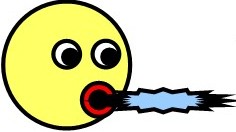Tomorrow marks the fifth anniversary of the terrorist attacks of September 11, 2001. That date is the center panel of the triptych, but there are other panels on each side. The one on the left is marked September 10th; the one on the right is marked September 12th. The events of 9/11 cannot be understood without also understanding how we were in the comparative innocence of 9/10, as well as understanding how we were changed on 9/12. Today, I'll write about the first panel of the triptych, September 10th.
It is rare when we can mark the exact dates that a historical era begins and ends, but we can do so for the "Holiday From History" decade that began with the dissolution of the Soviet Union on December 26, 1991, and ended when the first plane hit the World Trade Center at 8:46 a.m. on September 11, 2001. That decade seems like a golden age in retrospect, as if encased in amber. We were the world's only remaining superpower and we had reached The End of History, and we had won. The opposing ideology, communism, was discredited and tossed unceremoniously on the ash heap of history. Representative democracy was the wave of the future, and since we no longer had enemies, we could cut our defense budgets and instead use our time and effort to enrich ourselves.
There were some troubling things happening around the margins however, like something on the edge of our peripheral vision. American and coalition military troops were stationed in Saudi Arabia after forcing Saddam Hussein to leave Kuwait, and the effect of having "infidels" on "holy" Saudi Arabian soil was to radicalize even further the Wahhabi Muslims who already hated and wanted to kill everyone who didn't follow their particular dark vision of Islam. These hate-filled Muslims began blowing things up, including embassies in Africa and the U.S.S. Cole which was stationed in the waters off Yemen.
This was happening in benighted parts of the world, however, and most Americans just shook their heads and said, "Well, that's just the way those folks over there are," and went on about their business. We didn't like seeing Americans get blown up but it seemed as if people who went into places full of crazy religious fanatics were making their own choice to tempt the fates. We just hoped they were being well-paid to take that risk.
The news media's primary concern was scandal, and fortunately for them, we had a presidential administration which was adept at providing it for them. When the President wasn't in trouble for his freewheeling sexuality, the press managed to find others who were. Even when President Clinton left office and President Bush took over, the media still had all the gravity of a helium balloon, focusing on missing women and sharks biting people. Was there an enemy lurking in the shadows, preparing to strike? They didn't know and if they did, they would have given us something more controversial to get better ratings.
The signs were there, for those who could read them. But dealing with the incipient problem in any way other than lobbing a couple of cruise missiles could have led to dead Americans, which Clinton wanted to avoid at all costs. Bad for his legacy and all that. There were opportunities to take out Osama Bin Laden, and Clinton failed to take advantage of his opportunities during his eight years in power. Bush, in contrast, had less than eight months in power before 9/11, and most of his political appointments had not yet been approved, hobbling the early months of his administration. Bush was not blameless for not getting Bin Laden in his first eight months, but a lot more blame accrues to Clinton, who had much more time and several known opportunities to take him out.
It comes down to this, though: Would getting rid of Bin Laden prior to 9/11 have prevented the attacks? The answer is "probably not," because while he was the main guy in charge of Al Qaeda, he was not their only leader. Just as assassinating Adolf Hitler wouldn't have ended World War II, because there were a lot of other adherents to his evil ideology. We only won World War II after we (and the Soviets and our other Allies) killed a whole lot of Germans, and the ones who survived decided that they didn't want to be Nazis any more because it had led to the destruction of their nation. We didn't try to "change hearts and minds," we just killed them and kept killing them until they all gave up.

